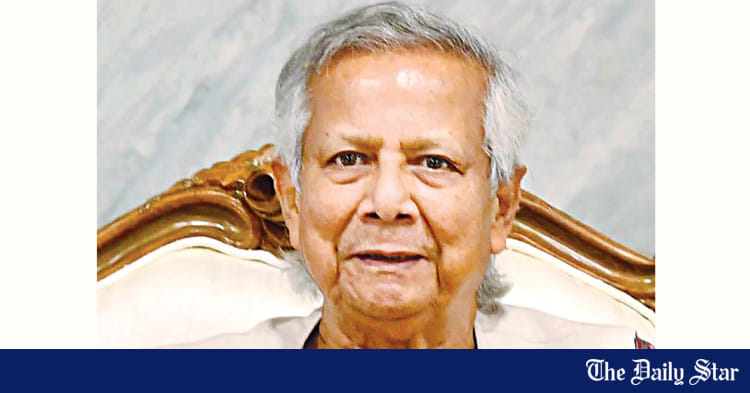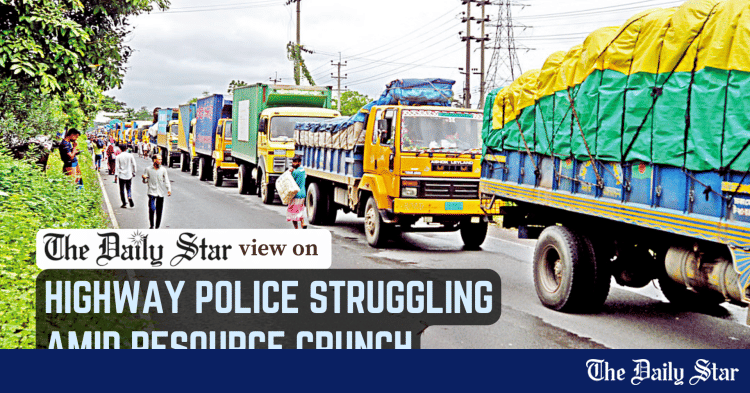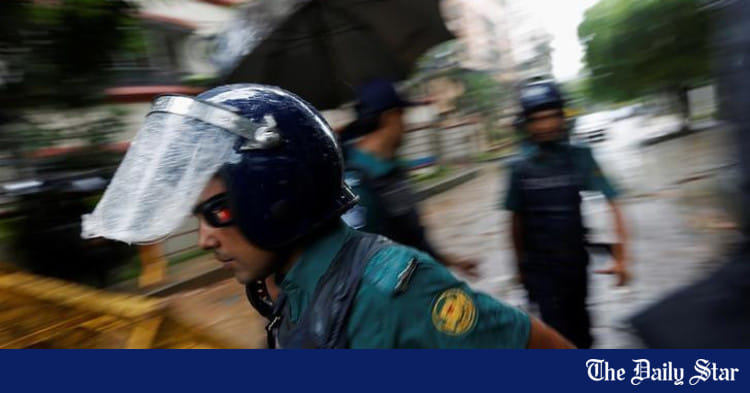Saif
Senior Member
- Joined
- Jan 24, 2024
- Messages
- 17,262
- Likes
- 8,334
- Nation

- Residence

- Axis Group


Police aggrieved with recommendations, top officials to meet Chief Adviser
Discontent has been created in the police force regarding certain recommendations of the Police Reform Commission as well as its omission of several essential proposals. One of the primary concerns is the setting up of an independent police commission.
Reform commission report
Police aggrieved with recommendations, top officials to meet Chief Adviser
Mahmudul Hasan
Dhaka
Updated: 16 Mar 2025, 18: 32

Discontent has been created in the police force regarding certain recommendations of the Police Reform Commission as well as its omission of several essential proposals. One of the primary concerns is the setting up of an independent police commission.
According to relevant sources, discussions were held on the necessity of forming an independent police commission to ensure the professional and politically neutral operation of the force. However, the reform commission did not come up with any specific framework in this regard.
Instead, it stated that expert opinions should be sought and a thorough process of “examination and evaluation” should be undertaken before reaching a decision.
Additionally, there is dissatisfaction within the force over the absence of recommendations for the establishment of an independent complaints commission to oversee police misconduct. Furthermore, the exclusion of police reform from the agenda of the National Consensus Commission has also contributed to the discontent among the police.
Chief Adviser Professor Muhammad Yunus will sit with the police officials from various levels on Monday regarding this.
According to relevant sources, during this meeting, police officers will present their concerns regarding the limitations and challenges they face in maintaining law and order and managing the force.
Additionally, they will bring to the government’s attention the perceived shortcomings of the reform commission’s “weak” report, particularly its failure to address key aspects of necessary reforms.
Police sources have confirmed that the meeting will take place at the Chief Adviser’s office, with attendance from all district superintendents of police (SP), range DIGs (Deputy Inspector of Police), metropolitan police commissioners, heads of all units, three DIGs from the police headquarters, all additional IGPs and the IGP.
The Chief Adviser will deliver a directive speech to the senior police officials there.
On 12 March, the police headquarters issued a formal letter informing the concerned officials about the meeting with the Chief Adviser. Prothom Alo talked to 13 invited officials and gleaned information regarding the topics of discussions and concerns that the police force will raise.
Several police officials, on condition of anonymity, have stated that they wish to inform the Chief Adviser about the reasons behind the police force’s excessive actions during the previous government’s tenure.
They also intend to emphasise that unless an independent authority is established to oversee police operations, similar situations could arise in the future. Therefore, despite the absence of such provisions in the reform commission’s recommendations, the officials will urge the Chief Adviser to take necessary steps towards implementing essential reforms, including the formation of an independent police commission.
However, when asked about Monday’s meeting, IGP Baharul Alam told Prothom Alo, “The Chief Adviser will deliver a directive speech to us at his office. We hope this will further inspire the police force.”
Objections over commission’s recommendation and role
Before the fall of the Awami League government due to the student-people uprising, a section within the police fired indiscriminately, resulting in the deaths of numerous individuals.
Consequently, following the formation of the interim government, demands arose for the establishment of an “independent police commission” to ensure the police remain impartial and free from external influence.
On 3 October last year, the interim government formed the Police Reform Commission, which submitted its report to Chief Adviser Professor Muhammad Yunus on 15 January.
The student representative in the reform commission advocated for the establishment of a separate commission for the police.
The reform commission’s report stated that there was a general consensus on the necessity of forming a neutral and independent police commission.
It recommended that expert opinions should determine whether the proposed police commission would function as a statutory body under the law or be incorporated within the constitutional framework.
Furthermore, the report highlighted the need for further scrutiny and analysis regarding the commission’s structure, scope of work, constitutional or legal obligations and other relevant considerations.
Police have expressed strong objections to this section of the report. They believe that the Police Reform Commission has disregarded public demands in its recommendations.
The officials argue that the commission itself was formed with expert members and yet, its recommendations call for further expert opinions. This, they claim, raises questions about the commission’s role and competence. Furthermore, many officers consider the mention of “examination, evaluation and analysis” as a strategy to delay the reform process.
A senior police official, wishing not to disclose identity, told Prothom Alo, “The core issue within the police force is unlawful orders and political influence. This influence stems primarily from recruitment, transfers, promotions and postings. If these matters were handled by an independent police commission, political interference in the police force would be significantly reduced.”
“Under the current system, where the police remain under the jurisdiction of the Ministry of Home Affairs, true reform will never be achieved,” the official insisted.
On 12 February, the government formed the National Consensus Commission, chaired by Chief Adviser Professor Muhammad Yunus, to review and implement the recommendations of various reform commissions.
The official notification stated that police reform recommendations would also be considered. However, the Consensus Commission subsequently began working on the recommendations of the other five commissions, excluding the Police Reform Commission.
At a press conference on 10 March, Consensus Commission vice-chairman Ali Riaz stated that key recommendations from the five commissions had been organised into a structured framework.
However, the recommendations of the Police Reform Commission were not included in this framework.
He further mentioned that the Police Reform Commission believes its proposals can be implemented through the existing administrative system.
This statement, made by the Police Reform Commission, led by former secretary Safar Raj Hossain, has sparked displeasure among police officials. Many believe that suggesting police reform through administrative measures undermines the expectations of meaningful reforms within the force, potentially stalling progress.
What kind of commission did the police want to see?
As the governing authority, the police had submitted certain recommendations to the reform commission regarding the structure of the police commission. According to these recommendations, the police commission would be considered a statutory, independent and impartial body.
The commission would comprise of 11 members, with the chairperson being either a retired justice of the Appellate Division or a retired IGP. The members of the police commission would be appointed, elected or nominated on either a permanent or part-time basis.
In consultation with the Speaker of the National Parliament, the leader of the house and the leader of the opposition, four members of parliament would be nominated as commission members. Among these four, two would be from the ruling party, one from the main opposition party and one to be nominated through consensus among the other parties.
The tenure of both political and non-political members would be four years and no individual would be eligible for a second term.
Four remaining non-political members of the police commission would be selected from various professions based on the recommendations of a selection committee. These members would include a legal expert, a retired IGP, an expertise in sociology or policing and human rights activists.
However, at least one of these four individuals must be a woman. The remaining two members would be the secretary of the Ministry of Home Affairs and the IGP serving as the member secretary of the commission.
The commission would also have a three-member complaints management committee. This committee would primarily function as the appellate authority for the existing complaint management system concerning the police.
A senior official from the police headquarters informed Prothom Alo that the most crucial aspect of police reform was the establishment of an independent police commission. The police had submitted a comprehensive and impartial proposal to the reform commission in this regard, which could have been modified as necessary. However, instead of proceeding with these recommendations, the reform commission suggested further analysis and evaluation of the police commission’s formation. The situation appears as though another commission would need to be formed simply to assess their recommendations!
* The report, originally published in the print and online edition of Prothom Alo, has been rewritten in English by Nuzhat Tabassum
Mahmudul Hasan
Dhaka
Updated: 16 Mar 2025, 18: 32
Discontent has been created in the police force regarding certain recommendations of the Police Reform Commission as well as its omission of several essential proposals. One of the primary concerns is the setting up of an independent police commission.
According to relevant sources, discussions were held on the necessity of forming an independent police commission to ensure the professional and politically neutral operation of the force. However, the reform commission did not come up with any specific framework in this regard.
Instead, it stated that expert opinions should be sought and a thorough process of “examination and evaluation” should be undertaken before reaching a decision.
Additionally, there is dissatisfaction within the force over the absence of recommendations for the establishment of an independent complaints commission to oversee police misconduct. Furthermore, the exclusion of police reform from the agenda of the National Consensus Commission has also contributed to the discontent among the police.
Chief Adviser Professor Muhammad Yunus will sit with the police officials from various levels on Monday regarding this.
According to relevant sources, during this meeting, police officers will present their concerns regarding the limitations and challenges they face in maintaining law and order and managing the force.
Additionally, they will bring to the government’s attention the perceived shortcomings of the reform commission’s “weak” report, particularly its failure to address key aspects of necessary reforms.
Police sources have confirmed that the meeting will take place at the Chief Adviser’s office, with attendance from all district superintendents of police (SP), range DIGs (Deputy Inspector of Police), metropolitan police commissioners, heads of all units, three DIGs from the police headquarters, all additional IGPs and the IGP.
The Chief Adviser will deliver a directive speech to the senior police officials there.
On 12 March, the police headquarters issued a formal letter informing the concerned officials about the meeting with the Chief Adviser. Prothom Alo talked to 13 invited officials and gleaned information regarding the topics of discussions and concerns that the police force will raise.
Several police officials, on condition of anonymity, have stated that they wish to inform the Chief Adviser about the reasons behind the police force’s excessive actions during the previous government’s tenure.
They also intend to emphasise that unless an independent authority is established to oversee police operations, similar situations could arise in the future. Therefore, despite the absence of such provisions in the reform commission’s recommendations, the officials will urge the Chief Adviser to take necessary steps towards implementing essential reforms, including the formation of an independent police commission.
However, when asked about Monday’s meeting, IGP Baharul Alam told Prothom Alo, “The Chief Adviser will deliver a directive speech to us at his office. We hope this will further inspire the police force.”
Objections over commission’s recommendation and role
Before the fall of the Awami League government due to the student-people uprising, a section within the police fired indiscriminately, resulting in the deaths of numerous individuals.
Consequently, following the formation of the interim government, demands arose for the establishment of an “independent police commission” to ensure the police remain impartial and free from external influence.
On 3 October last year, the interim government formed the Police Reform Commission, which submitted its report to Chief Adviser Professor Muhammad Yunus on 15 January.
The student representative in the reform commission advocated for the establishment of a separate commission for the police.
The reform commission’s report stated that there was a general consensus on the necessity of forming a neutral and independent police commission.
It recommended that expert opinions should determine whether the proposed police commission would function as a statutory body under the law or be incorporated within the constitutional framework.
Furthermore, the report highlighted the need for further scrutiny and analysis regarding the commission’s structure, scope of work, constitutional or legal obligations and other relevant considerations.
Police have expressed strong objections to this section of the report. They believe that the Police Reform Commission has disregarded public demands in its recommendations.
The officials argue that the commission itself was formed with expert members and yet, its recommendations call for further expert opinions. This, they claim, raises questions about the commission’s role and competence. Furthermore, many officers consider the mention of “examination, evaluation and analysis” as a strategy to delay the reform process.
A senior police official, wishing not to disclose identity, told Prothom Alo, “The core issue within the police force is unlawful orders and political influence. This influence stems primarily from recruitment, transfers, promotions and postings. If these matters were handled by an independent police commission, political interference in the police force would be significantly reduced.”
“Under the current system, where the police remain under the jurisdiction of the Ministry of Home Affairs, true reform will never be achieved,” the official insisted.
On 12 February, the government formed the National Consensus Commission, chaired by Chief Adviser Professor Muhammad Yunus, to review and implement the recommendations of various reform commissions.
The official notification stated that police reform recommendations would also be considered. However, the Consensus Commission subsequently began working on the recommendations of the other five commissions, excluding the Police Reform Commission.
At a press conference on 10 March, Consensus Commission vice-chairman Ali Riaz stated that key recommendations from the five commissions had been organised into a structured framework.
However, the recommendations of the Police Reform Commission were not included in this framework.
He further mentioned that the Police Reform Commission believes its proposals can be implemented through the existing administrative system.
This statement, made by the Police Reform Commission, led by former secretary Safar Raj Hossain, has sparked displeasure among police officials. Many believe that suggesting police reform through administrative measures undermines the expectations of meaningful reforms within the force, potentially stalling progress.
What kind of commission did the police want to see?
As the governing authority, the police had submitted certain recommendations to the reform commission regarding the structure of the police commission. According to these recommendations, the police commission would be considered a statutory, independent and impartial body.
The commission would comprise of 11 members, with the chairperson being either a retired justice of the Appellate Division or a retired IGP. The members of the police commission would be appointed, elected or nominated on either a permanent or part-time basis.
In consultation with the Speaker of the National Parliament, the leader of the house and the leader of the opposition, four members of parliament would be nominated as commission members. Among these four, two would be from the ruling party, one from the main opposition party and one to be nominated through consensus among the other parties.
The tenure of both political and non-political members would be four years and no individual would be eligible for a second term.
Four remaining non-political members of the police commission would be selected from various professions based on the recommendations of a selection committee. These members would include a legal expert, a retired IGP, an expertise in sociology or policing and human rights activists.
However, at least one of these four individuals must be a woman. The remaining two members would be the secretary of the Ministry of Home Affairs and the IGP serving as the member secretary of the commission.
The commission would also have a three-member complaints management committee. This committee would primarily function as the appellate authority for the existing complaint management system concerning the police.
A senior official from the police headquarters informed Prothom Alo that the most crucial aspect of police reform was the establishment of an independent police commission. The police had submitted a comprehensive and impartial proposal to the reform commission in this regard, which could have been modified as necessary. However, instead of proceeding with these recommendations, the reform commission suggested further analysis and evaluation of the police commission’s formation. The situation appears as though another commission would need to be formed simply to assess their recommendations!
* The report, originally published in the print and online edition of Prothom Alo, has been rewritten in English by Nuzhat Tabassum









































